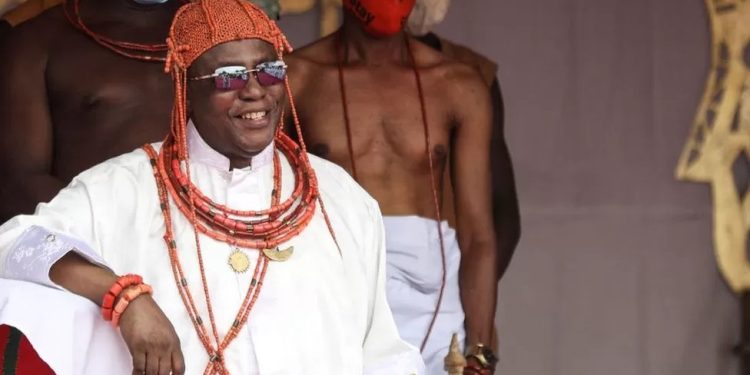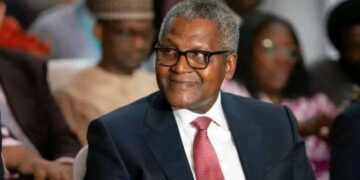The President of Nigeria, who is currently in the process of leaving office, has made a statement regarding the Benin Bronzes. This announcement has the potential to greatly impact the movement advocating for the repatriation of these culturally significant artefacts. Journalist Barnaby Phillips has been investigating this matter.
During the final weeks of his tenure, President Muhammadu Buhari of Nigeria made a decision that elicited a combination of positive, negative, and uncertain reactions.
The public announcement of his statement on March 23rd unambiguously acknowledges the proprietorship of the renowned Benin Bronzes to the Oba, also known as the king, of Benin, Ewuare II.

Numerous metal castings and ivory carvings were unlawfully taken by a British military expedition in 1897 from the Benin kingdom, located in present-day southern Nigeria. These artefacts are currently housed in museums primarily situated in Europe and the United States.
In recent times, a number of museums have initiated the process of repatriating the Bronzes in response to requests from Nigeria as well as from their own communities.
As per the declaration made by the Nigerian President, it has been stated that any repatriated Bronzes shall be surrendered to the Oba, who holds the responsibility of managing all the locations where they will be preserved.
This may encompass the Oba’s palace or any other location deemed secure by the Nigerian government and the Oba.
The transportation of any Benin Bronze artefact is strictly regulated by the Oba’s written authorization, and upon its return, each piece must undergo inspection and authentication by the Oba.
The monarch, recognized as the Oba of Benin, with the title of Omo NOba Uku Akpolokpolo, Ewuare II.
As per the presidential decree, it has been established that Oba Ewuare II is the rightful legal proprietor of the Benin Bronzes.
To clarify, Ewuare II has been granted extensive authority.
It seems that the Nigerian government’s National Commission for Museums and Monuments (NCMM), which has been responsible for negotiating the return of colonial-looted artefacts, may be experiencing some setbacks as a result of these developments.
During the recent visit of the Dutch ambassador to the palace in Benin City, the Oba expressed himself with assurance.
According to the Oba, the president has expressed his message unambiguously. The institution of the Oba is vested with the ownership, custody, and management responsibilities. This statement denotes a legal provision.
The proclamation made by the president has been well-received by a significant number of individuals belonging to the Benin community, commonly referred to as the Edo.
The Benin Bronzes have gained global recognition as artistic masterpieces during their prolonged stay in Western museums. However, their spiritual significance predates this recognition.
The artefacts were crafted by esteemed guilds under the patronage of the monarchy, with the purpose of honouring the forebears of the Oba, and were subsequently housed within the confines of the palace.
Ewuare II is a descendant of the deposed Oba, and his palace was constructed on the site of the former palace that was demolished during the British invasion.
The NCMM, an organization purportedly responsible for safeguarding the nation’s cultural legacy, has expressed discontent at not being acknowledged in the president’s statement.
The situation caught us off guard unexpectedly. According to an official, the aforementioned proposal lacks practicality and compatibility with the current Nigerian legal framework. Furthermore, the individual who authored the proposal appears to have a limited understanding of the operational dynamics of museums.
According to reports, the Nigerian Ministry of Justice has extended an invitation to the NCMM to provide revisions to the declaration made by the President.
President Buhari may perceive this issue as more appropriately delegated to his successor, President-elect Bola Tinubu, who is scheduled to be inaugurated on the 29th of May.
The inherent contradictions and fragilities of Nigeria, stemming from the haphazard amalgamation of its diverse ethnic groups by the British in 1914, remain a persistent concern.
One of the concerns of the National Collections Management Committee (NCMM) pertains to the inadvertent undermining of the rationale for a national collection by President Buhari.
In the event that the Oba’s possession of the Bronzes transitions from a theoretical concept to a tangible reality, would it not imply that each Nigerian traditional ruler or community bears responsibility for safeguarding the artefacts crafted by their forebears?
The National Commission for Museums and Monuments (NCMM) endeavours to establish a Museum of National Unity in Abuja, the nation’s capital, with the intention of housing artefacts such as the Benin Bronzes. The realization of said ambition may prove to be more challenging at present.
The priorities of Oba Ewuare II and his council are primarily centred on regional political matters.
The individuals in question perceive the president’s declaration as a triumph over the governor of Edo State, Godwin Obaseki, with whom they maintain a strained relationship.
The Edo Museum of West African Art (EMOWAA) in Benin City has received support from Governor Obaseki, with involvement from renowned Anglo-Ghanaian architect Sir David Adjaye and international funding.
The “Where Is Africa” exhibition at the Linden Museum features sculptures that were looted by British soldiers from the Kingdom of Benin in 1897 and are currently on display.
The Benin Bronzes were subject to looting towards the conclusion of the 19th Century, subsequently finding their way into the possession of museums and private collectors.
According to EMOWAA, the completion of its inaugural edifice is slated for the year 2024.
Despite relinquishing its initial goal of becoming the repository for the most extensive assemblage of Benin Bronzes worldwide, the institution continues to be regarded with scepticism by palace authorities.
According to the Oba, the Benin Bronzes that have been repatriated will eventually be exhibited in the Benin Royal Museum, which has been a topic of much discussion. The museum will be situated in close proximity to the palace and will be constructed with the backing of the Nigerian government.
As per Oba’s statement, there is a collective effort being made towards the development of this museum.
Museums located in Europe are experiencing a state of perplexity, which may be perceived as reasonable.
According to the German government, the issue of returning the Benin Bronzes is a matter that falls within the internal affairs of Nigeria, and they have taken the initiative to lead the process. However, certain diplomats express concern.
According to a prominent German official, “We engaged in negotiations with the Nigerian government to repatriate Bronzes to the NCMM and subsequently entered into contractual agreements with the NCMM. Therefore, to whom shall we be transferring the Bronzes?”
In November 2022, Annalena Baerbock, the Foreign Minister of Germany, travelled to Abuja and ceremoniously presented approximately 20 Bronzes to the Minister of Culture of Nigeria. The individuals in question are currently under the custody of the Norwegian Centre for Molecular Medicine (NCMM).
One of the officials of the Oba expressed that there would be a difference in the approach taken in the future.
According to a source closely related to the Oba, the National Commission for Museums and Monuments (NCMM) has mishandled its returns by clandestinely signing agreements.
However, both he and officials from NCMM expressed their unwavering commitment to ameliorating underlying conflicts and collaborating harmoniously.
According to the speaker, it is advisable not to interpret the presidential declaration in a literal sense, but rather as a recognition of the central role that the Oba must play in the process.
British museums are also faced with the challenge of navigating Nigerian politics.
On the 16th of May, a Nigerian delegation was scheduled to receive 116 Benin Bronzes from the Museum of Archaeology and Anthropology at Cambridge University.
The occurrence would have carried significant symbolism.
The city of Cambridge possesses the second-largest assemblage of Benin Bronzes in the United Kingdom, following the British Museum’s collection. The latter institution has become progressively isolated in its stance regarding the matter of restitution.
The event hosted by Cambridge has been postponed without public announcement.
An official diplomatically explained that due to some confusion, it was deemed more appropriate to temporarily halt the proceedings. October has been proposed as a potential alternative date.
The director of the museum, Nicholas Thomas, expressed his confidence that the transfer of ownership will proceed without any uncertainty.









